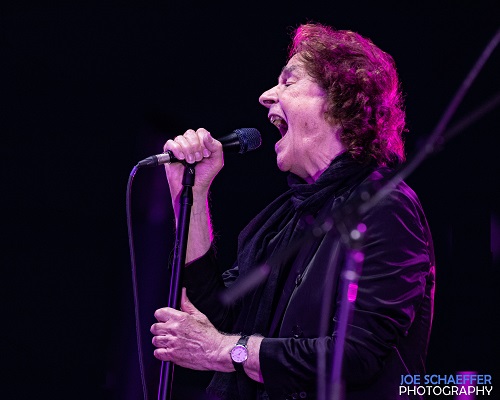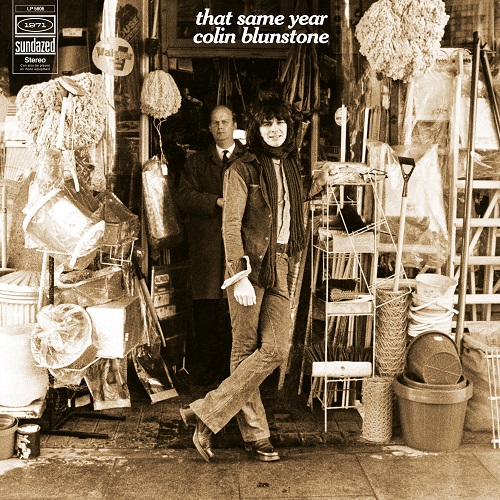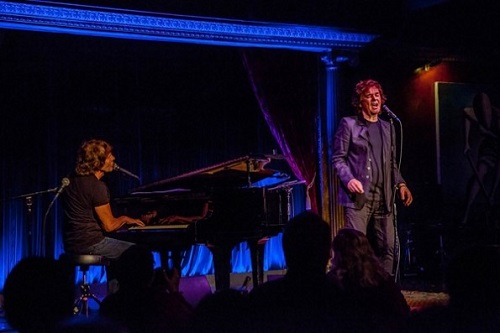By Susan Enterline
For devotees of rock music and its legendary singers, the name Colin Blunstone instantly conjures thoughts of the hauntingly ethereal-voiced singer for The Zombies — his unique vocals adding immediate sensuous cool to the jazzy “She’s Not There” and soulful panache to the iconic late 60s hit “Time Of The Season.”
His career also encompasses a vibrant and ongoing body of work as a solo artist — whether on his own, or in memorable sessions with the Alan Parsons Project and others. But there is another side to this brilliant coin, i.e., Blunstone’s considerable talents as a songwriter. While not as prolific as, say, several of his Zombies bandmates, his catalog of close to 80 published songs includes a fair number of significant — and in some cases, exquisitely beautiful — works of art.
Amongst his first forays into the mysterious process of song creation was the delightful 60s rocker “Just Out Of Reach,” a tune that featured prominently in 1965 film Bunny Lake Is Missing. But it wasn’t until 1970, after a long hiatus and the breakup of The Zombies (and an interlude as his alter-ego, Neil MacArthur), that he jumped back into the songwriting waters for his first solo album, One Year.
As it happens, One Year celebrated its 50th anniversary in November 2021, offering up a perfect moment to explore the lesser known “other side” of this sensitive, enigmatic artist. Though very humble about his songwriting skills, in this interview the singer sheds some long-awaited light on his own personal song-crafting journey.
~
You are best known as a singer, but you’ve also written quite a few songs yourself. Was it always something that interested you?
When I first started playing in a band, I think most people believed that artists sang songs written for them by songwriters. It seemed two very distinct and different professions. All this changed with The Beatles who after their earliest recordings began writing and recording all their own songs. Soon artists understood that not only was it possible to write and record their own material but that it made a huge difference in credibility and of course financially. Once I realized that I could write songs I found the whole process of writing, recording, and performing new material incredibly exciting and fulfilling.
What was the first song you ever wrote, and how did it come about?
The first song I wrote was “How We Were Before,” which was recorded by The Zombies. It has a lyric inspired by my first proper teenage relationship and uses a simple guitar chord progression in D. In the studio the band always sang “God Save The Queen” over the chords that followed the title line, which helped me keep my feet on the ground!
Cheeky! Your second original song was “Just Out Of Reach” for the film Bunny Lake Is Missing. It’s a real rocker, very upbeat, and a great representation of the ‘60s sound. What was the background story on this?
After a sort of audition in front of Otto Preminger and his entourage in The Cromwellian Club, we were asked to write and record three new songs in about 10 days. The reason they had to be new songs was because “the film people” wanted a share of the publishing revenue and all our recorded songs were already signed to a publisher. At the time Rod hadn’t got any new songs, though Chris had a couple that were eventually used in the film. I just did my best to “fill the gap” and come up with the third song, which eventually presented itself as “Just Out Of Reach”
Otto Preminger was known as a rather difficult director with a somewhat volatile personality. Did he show any appreciation for your efforts?
Preminger was difficult. He was very tough on his staff and had one of them in tears on the set. His aggression didn’t really work with us as it wasn’t particularly important to us whether he used our songs or not. I don’t remember him being particularly appreciative of our efforts.
The music, with different lyrics, was also used to promote the film — as “Come On Time” — so presumably somebody recognized its value. . .
The “film people” wrote the different lyrics and asked for the second version to promote the film. Sorry if this all sounds a bit vague, but remember we were touring the whole time this film was being made, so we weren’t really that involved other than to quickly write and record a few songs. It probably would have made more sense if we’d had a bit more time to work on the project.
But then you didn’t write, or at least record your own songs, for many years — until the early 70s, perhaps? Then you wrote four beautifully sophisticated tracks for the original release* of your first solo album, the critically acclaimed One Year – which is currently celebrating its 50th anniversary — one of which was a hit single. (*A fifth song, “[I Hope I Didn’t Say] Too Much Too Soon Last Night” was added to the 2006 re-release of One Year) What inspired you to start composing again in earnest?
I think I always kept playing and trying to write but there wasn’t really an audience for my songs. It wasn’t until I signed a solo deal with CBS for One Year that I had a vehicle to write for.
John Lennon famously said, “Songwriting is about getting the demon out of me. It’s like being possessed.” Demons aside, do you need to feel inspired in order to write a song?
Generally, I think you do have to feel a bit inspired to write songs, but it can be quite a subtle feeling, not like you’re walking on air, it’s just suddenly all the pieces fall into place and you’re praying you can hold onto the moment till the song is finished.
Some writers describe the feeling of having a song “downloaded” almost complete — if that’s what you mean? Any song or songs that just sort of appeared out of thin air, that you can think of? So many of your songs are very romantic, which to my thinking would tend to favor that particular kind of magic.
I remember a song from One Year called “I Can’t Live Without You” just sort of arriving almost spontaneously but it doesn’t happen very often for me.
Of course, there are other songs that are written almost one word at a time, sometimes over many months or even years. You end up completing the song almost like a crossword.
Do you find it’s easier to write when you’re feeling happy or unhappy?
I think either happiness or unhappiness can be a catalyst for songwriting, but often when you’re really happy you’re too busy being happy to find the time to write!

And then there’s the which-came-first question. I’ve heard you talk about doodling around on your guitar looking for unique chord progressions (possibly egged on by The Zombies’ cheeky response to your first effort), which implies that the music is your starting point. But you’ve also said that most if not all your songs relate to something that’s actually happened, either to you or someone you know. So, which comes first, generally speaking — the words/emotion or the music?
Songwriting can be such a mystical process that it’s difficult to quantify, but I think I usually start off with a chord progression — although to be honest I’ll use anything to get a song started, chords, lyric, title, or a rhythm. The lyrics do usually loosely refer to something that has happened to me or someone I know. I have never thought of my lyrics as poetic but more as storytelling.
As far as storytelling goes, I think many people know the history behind “Caroline Goodbye,” but one of the loveliest stories I’ve heard you tell is the genesis of “I’ve Always Had You” (from Ennismore). For a long time, I thought you were talking about yourself (though it didn’t quite work much beyond the title, I do realize!) But that wasn’t it at all, was it?
I found it an uplifting thought that somewhere in the world was that special person that I would spend my life with. Though I hadn’t met them yet, it was magical and mystical to know they were always there and that thought gave me strength when times were hard.
It’s certainly a very positive attitude! But when it comes to other writers, who do you admire most? Perhaps besides Rod Argent and Chris White, who we can probably assume are two of them.
Apart from Rod and Chris, I think my favorite songwriters would be much the same as anyone else who followed music from the 60s and 70s: The Beatles, Joni, Sting, Stevie Wonder, Elton and Bernie, Brian Wilson.
But when I first started writing, the person who influenced me most (besides Rod Argent and Chris White) was a singer-songwriter called Duncan Browne who I shared a flat with around 1970. He was a great guitarist and his songs as a solo artist and as a member of the band Metro still very much stand the test of time.
It had to have been inspiring sharing space with such a brilliant artist who was also a friend. More generally speaking, does hearing others’ songs inspire you to write – and if it does, is it more likely to be a piece of popular music, or perhaps from another genre altogether — classical, jazz, etc.?
It was inspiring to listen to Duncan composing, and he was also very supportive and encouraging when I got a song idea. In general, I think anything that moves me emotionally inspires me to write. It can be any kind of music, a film or a book or something happening in real life that sparks an idea.
Once a song is written, how do you decide it’s good enough to put out into the world? Do most of them make the cut?
It can be difficult to judge your own work, but I think a combination of playing a new song to trusted friends for a reaction and listening closely over a period of time will eventually show you a song’s true value. Nowadays most songs I write are recorded, but when I first started writing there were many that “didn’t make the cut.”
Writing a song, you must have a particular vision of how it should sound. But when you go into the studio to record, you entrust it to your fellow musicians, which inevitably leads to change. Do you find that exciting, or nerve-wracking — or both?
I always used to say that hit records come out of the studio rather than go into the studio — meaning that how a song evolves in the studio can dictate its success artistically and commercially. I’ve always found the recording of a new song a very exciting process, though it’s usually not without a few nerve-wracking moments too!
Have you ever felt particularly surprised — for better or worse — how a song evolved during the process?
There’s a song called “Exclusively For Me,” which I wrote with David Jones and was recorded by Dusty Springfield, that took on a whole new dimension with Dusty’s sublime performance. For the reverse process I once recorded a favorite song with The Zombies called “Knowing You.” Unfortunately, when a record company heard the whole album, they asked for “more guitars” and the modified version of my song lost everything. I have subsequently tried to record the song again and unfortunately failed miserably again. It’s hard to give up on a song when you know it’s got potential, but you can’t keep on recording and re-recording the same song…or can you?
I’d say it’s intriguing to think there might be new life in a few hidden masterpieces! What about live performances — is it easier to perform your songs than those written by others? Knowing that you work very hard on phrasing when you sing (thinking back as far as “Time Of The Season” with The Zombies, and the “challenges” you had then), I assume they must flow much more naturally, because they are inherently “you.”
“Time Of The Season” was particularly challenging because it had only just been written and I didn’t know it really thoroughly. We were also up against the clock, which didn’t help.
But I usually record the vocals on my own songs very quickly. All the phrasing issues have been worked on during the writing process; all we’re looking for is a special performance. Conversely, I will often spend hours on the approach and phrasing of someone else’s song. I’m only interested in the end result, and if a song is successful no-one remembers how long it took to record.
Besides the previously mentioned Dusty Springfield, your songs have also been recorded by other prestigious artists, including Roger Daltrey of The Who. Personally, I love Dusty’s version of “Exclusively For Me,” and apparently others do as well, as it has appeared on several collections of her top songs…
Yes, I’ve already mentioned Dusty’s performance of “Exclusively For Me” and I’m extremely proud that she recorded one of my songs. I think her performance is wonderful.
And Roger Daltrey included “Single Man’s Dilemma” on his critically acclaimed album, One Of The Boys. I think that came out before you released it on one of the Rocket albums, Late Nights In Soho.
There have been several versions of this song. Apart from Roger’s great track, I liked the way my solo band played it “live” on recent tours.
And, of course, several of your songs have been amongst the most popular recent releases by The Zombies. “Any Other Way” from The Ghost Of You & Me was reprised on Breathe Out, Breathe In (and safe to say, it was one of the most popular tracks on the album), and a re-imagined “Now I Know I’ll Never Get Over You” on Still Got That Hunger — an album that charted in the Billboard Hot 100 in 2015.
It’s worth noting, too, that “Any Other Way” was the very first official Zombies video release, debuting at a NYC premiere event in 2014. I’m sure that must’ve been a point of pride for you, that your song was selected for something so historic…
“Any Other Way” is a favorite song of mine and of course I’m really thrilled that The Zombies used it in their first official video release. I sometimes felt a bit guilty because the lyric uses one relationship for its inspiration at the beginning of the song and ends with a totally different relationship. I hope you can’t hear “the join” and, of course, the details of those relationships will always remain a secret!
Now, of course, I’m going to have to listen with that in mind. Coming back to the present, can we expect to hear any new material from you in the near future?
I’ve started a new solo album on three separate occasions over the last few years but am still not sure of the right approach. Hopefully I can get back in the studio soon.
Meanwhile, congratulations the 50th anniversary re-release of One Year. I wonder if you can say just a few words about that — particularly about That Same Year?
Yes, the remastered One Year was re-released in November (2021) to celebrate its 50th anniversary. It includes 14 demos of songs that were recorded at that time, under the title That Same Year. Some were used and some were forgotten but they do give a broader idea of how I was writing at that time. The demos were discovered quite by chance in (Zombie) Chris White’s attic as his sons Matthew and Jamie were searching through old tapes to catalogue a complete list of all of Chris’ compositions. Mostly they are just me playing guitar and singing, but on some tracks Rod Argent on piano and Duncan Browne on guitar add an extra color. The passing of time has left me with very little recollection of these sessions and on first listening my memory of some of the actual songs was a little sketchy too, but it was an exciting experience to re-visit these early compositions as they brought back so many memories form a time of innocence — half a century ago.
Well then, on second listening, did any stand out for you for any reason?
Two songs I do remember vividly are “Sing Your Own Song” and “Caroline Goodbye.” When “Time Of The Season” was a hit in America, The Zombies had already split up, leaving a bit of a void in the market. The music business hates a void and soon filled it with phony Zombies bands. Later Chris White was in Rolling Stone’s offices in New York, and they persuaded him to call the manager of one of these phony bands — and thinking Chris was a journalist, this manager explained the “his Zombies” had been formed to honor the life of the lead singer of the original Zombies (me!) who had been tragically killed in an accident. It felt like reading my own obituary and led me to write “Sing Your Own Song.” Listening to it after all this time, I think there is a chance I might try to expand and master this sorry tale of intrigue and tomfoolery.
“Caroline Goodbye” is (as you mentioned) a well-documented story of teenage angst and abandonment. I tried really hard to find another name that would work, but as the session date arrived, I threw caution to the wind and used the real name of an ex-girlfriend called Caroline Munro, who was a very famous model and later actress. I thought only a few close friends would understand how factual the song was, but the secret was given away by a national newspaper publishing a whole page on the story behind the song.

They are fascinating to hear, and the reviews have been stellar so far — both for the remastered One Year AND the demos. Regarding the latter, there’s a poignant simplicity and intimacy to hearing them before they grew up, so to speak. A perennial favorite of mine, the wistful “Though You Are Far Away,” was released in two different versions over the years, but here it is just you with Duncan Browne playing guitar, which gives it yet another intriguing dimension.
We chose to record One Year with brilliantly original string arrangements written by Chris Gunning, and I think they really work. But listening to these demos I realize you can still enjoy the songs in a simple guitar and voice formula.
Have these new discoveries made you consider revisiting any of them — re-recording or finishing any of the orphaned ones that weren’t finished back then?
They are probably too set in my mind now to revisit them on my own, but I think it could be an idea to work with someone else on expanding and finishing some of these basic song ideas.
Might there be more of these hidden gems out there, that could possibly see the light of day at some point?
Yes, I have recently discovered three reel-to-reel tapes which feature nine more forgotten demos — some that were eventually recorded and some that weren’t.
That sounds promising. But of the songs already out there, if you had to choose one to represent you as a songwriter, which would it be? Or if that’s too much, do you have a personal favorite (or favorites) amongst them all?
Off the top of my head, some personal favorites would be: “Though You Are Far Away,” “I’ve Always Had You,” “I Want Some More,” “Keep The Curtains Closed,” “What Is Love,” “Never Get Over You,” “Any Other Way,” and “The Sun Will Rise Again.”
I have to say, those are many of my favorites, too! The last one you mentioned, “The Sun Will Rise Again,” is an extraordinarily evocative and beautiful song, and I think it’s OK to reveal now that an especially gorgeous version of it will close out The Zombies’ upcoming album, Different Game. Would you care to say something about the song itself, and this particular version?
“The Sun Will Rise Again” was originally recorded with a string quartet for my solo album The Ghost Of You And Me. Now it’s been re-recorded to close the new Zombies album, Different Game. It’s the only track on the album that wasn’t recorded with everyone in the studio together. Tom Toomey copied my guitar parts exactly and then Soren Koch added bass with Rod Argent adding electric piano.
It is a love story of sorts, but a love story from a parent to a child. In fact the idea was triggered when my own daughter was going through a particularly challenging time and that situation led to the song idea.
That’s lovely, Colin. So, one last question: Of your more recent songs, “Dancing In The Starlight,” says: “If I had to do it all again, you know I’d do it just the same.” The song clearly describes a love story with a happy ending, but does that line also fairly sum up your overall philosophy of life, and your personal songwriting journey?
The idea behind that song is that if you change one thing in your life, however small, you will change everything. As I am very happy with how my life turned out, I can’t afford to want to change anything. In sharp contrast, I must admit I have made some terrible decisions in life and have often said to my daughter: “I would like you to observe and inwardly digest everything I’ve done in my life — and do the complete opposite!” Life’s complicated, isn’t it?





















